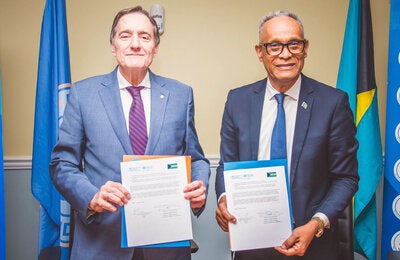

Health authorities in Central America have been deploying field teams for damage assessment, surveillance, water and sanitation and mental health assessments, after heavy rains caused flooding and landslides in El Salvador, Guatemala, Honduras and Nicaragua.
Health authorities in Central America have been deploying field teams for damage assessment, surveillance, water and sanitation and mental health assessments, after heavy rains caused flooding and landslides in El Salvador, Guatemala, Honduras and Nicaragua.
{slideshow}137,478,300,n{/slideshow}More than 600,000 people have been affected during the past 10 days, including 55,000 people who have taken refuge in some 700 shelters. More than 50 people have died as a direct consequence of the emergency. El Salvador, Guatemala and Nicaragua have declared official emergencies as a result of these events.

Emergency Operations Center at Escuintla
At the request of national health authorities, the Pan American Health Organization/World Health Organization (PAHO/WHO) has deployed a team of international experts to the region to support efforts in the areas of emergency coordination and risk communication and also to operate LSS/SUMA, a software program that increases efficiency and transparency in managing humanitarian supplies. In addition, PAHO's Emergency Operation Center is monitoring the situation from Washington, D.C., in coordination with PAHO's country offices in all four affected countries.
In addition to deaths and injuries, damages to health facilities and equipment and losses of health supplies have been reported. Respiratory infections as well as wound and skin infections are being reported from shelters. Standing water is known to increase mosquito populations, raising concerns in areas that are already known to have dengue. Gastroenteritis and leptospirosis are endemic in all four countries and flooding and displacement are expected to cause an increase in the number of cases of these diseases.
Preventive measures for the population include hand washing with water and soap or ash before preparing food, eating or feeding children and after defecating or handling the waste of children or people who are sick. Research has shown that hand washing with soap can reduce the incidence of diarrhea among children under 5 by almost 50 percent, and respiratory infections by nearly 25 percent.

Development partners are being asked for additional funds to complement the activities that governments, PAHO/WHO and other agencies are already implementing in response to the flooding in Central America. The funds will be used to reestablish health services and emergency medical care in isolated regions, to ensure access to clean water and sanitation measures and to implement disease surveillance and vector control activities. The Spanish Agency for International Development Cooperation (AECID) has already contributed US$100,000.
For more information visit PAHO's Area of Emergency Preparedness and Disasters Relief website



